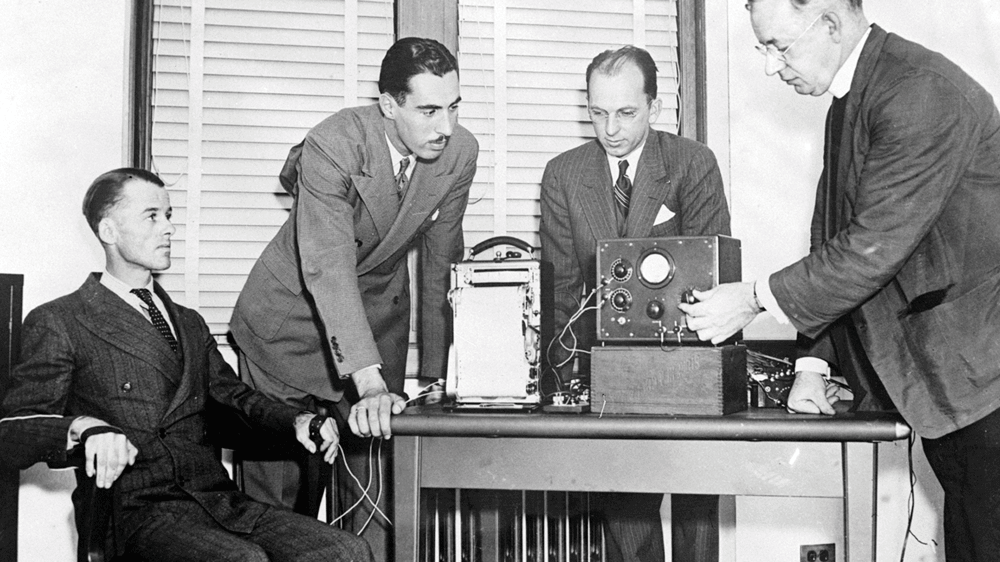How do you pass a lie-detector test? It’s easy to say that there’s a simple, three-word answer: “Tell the truth.” But while honesty is always the best policy, knowing a few things about how the test works—and how its readings can be interpreted by the operator— will help make sure that your answers accurately convey the truth to your interviewer.
Whether you’re being investigated for a crime you didn’t commit or you’re applying for a job with an organization that needs to investigate you for a secure position, being prepared for the test will help ensure that your truthful answers come through.
“THE POLYGRAPH DETECTS CHANGES IN YOUR BODY’S VITAL SIGNS—BREATHING RATE, HEART RATE, BLOOD PRESSURE, AND PERSPIRATION—SHOWING YOU ARE UNDER STRESS, WHICH—THE THEORY GOES—INDICATES THAT YOU ARE LYING.”
First, let’s talk about how a lie detector works. The technical name for a lie detector— the polygraph—refers to the way the device writes down multiple streams of data about your body as you are interviewed by the polygraph operator. The polygraph detects changes in your body’s vital signs—breathing rate, heart rate, blood pressure, and perspiration—showing you are under stress, which—the theory goes—indicates that you are lying.
Of course, the simple fact that you’re being interviewed—possibly even interrogated—while hooked up to a battery of electronic sensors can stress you out from the beginning. So here are a few tips from experienced polygraph operators to help you establish your innocence or get accepted for the job you want.
BEFORE YOUR INTERVIEW
Get a good night’s sleep, but don’t overmedicate: you’ll need to be clear-headed for the test the next day. Avoid alcohol, as it can cause you to wake in the middle of the night and actually get less sleep. If you take an antihistamine (such as diphenhydramine, the additive in various “night-time pain relief” medications) to make you drowsy, be sure not to take it in conjunction with decongestants such as pseudoephedrine or phenylephrine, as these can raise your blood pressure—the exact opposite of what you want on test day.

Think ahead about ways you calm yourself— obviously taking a walk won’t work, but breathe regularly, think relaxing thoughts (some people imagine they’re on a tropical beach), or physically relax your body as you sit in the examination chair. Clearing your mind of stress before the interview will help you be able to clear stress when you’re connected to the machine.
If you have any regular medications, be sure to take them at your normal time. Also, eat at your accustomed time—being hungry can raise your stress level and could lead to inaccurate results.
And speaking of time: Be sure to allow enough time to arrive at the polygraph location at least 10 minutes ahead of the scheduled appointment. The last thing you want is to arrive late, stressed out about the time or with your heart rate and blood pressure elevated from literally running to the interview.
DURING YOUR INTERVIEW

Wear professional-looking, conservative clothing. Don’t choose anything too expensive or flashy looking; the object is to look as neutral as possible. This isn’t the time to express your style; it’s time to be calm, selfpossessed, and as ordinary as possible. The examiner will ask you three kinds of questions:
Control: Control questions have no connection with why you’re there. They are meant to generate reactions similar to those you exhibit when lying. They are usually broad in scope and designed to make you feel stress, so that your answers show a reading against which the real questions can be compared. For example, a typical control question might be, “Have you ever betrayed someone who trusted you?” After the interview, the examiner will compare your readings on these control questions to the readings on the relevant questions.
Irrelevant: Irrelevant questions also have no connection with your reason for being there; they are obvious questions like, “Are the lights on in this room?” or asking you to confirm the date. These questions also serve as comparison to your reactions to the relevant questions, assuming that you’re giving a truthful answer.
Relevant: Relevant questions are the questions about which you are being examined. For example, a job interviewer might ask, “Have you ever stolen from an employer?” If your “no” answer here shows higher stress than the control and irrelevant questions, the interviewer will mark your answer as “deception.” Stress levels lower than the control questions will be interpreted as “no deception indicated” by the examiner.
When answering these different questions, give short and to-the-point answers. Don’t ramble—most questions you will be asked can be answered with yes or no. As they say, tell the truth, the whole truth, and nothing but the truth—giving more information than the examiner is asking you for can cause stress (leading to a false positive), or may simply look like you’re covering something up.
AFTER YOUR INTERVIEW
If your results show “no deception indicated” on all the relevant questions, congratulations, you’ve passed. But remember, it’s all based on comparing the readings during the control and irrelevant questions—meant to establish your stress level when giving an uncomfortable answer—against your readings during the relevant questions. By concentrating on your innocence, and on the truthfulness of your answers to the relevant questions, you should be able to relax enough even under the stress of the lie-detector test to establish your innocence.
Editors Note: A version of this article first appeared in the January 2015 print issue of American Survival Guide.


